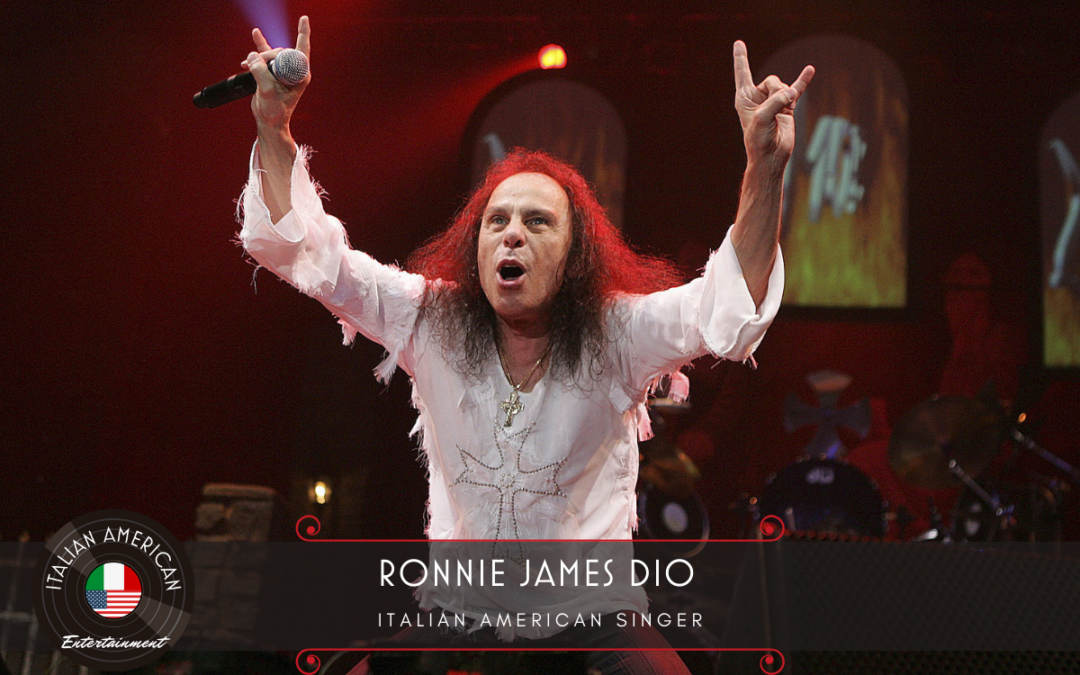Ronald James “Dio” Padavona was born in Portsmouth, New Hampshire, to Italian-American parents from Cortland, New York. Padavona listened to a great deal of opera while growing up, and was influenced vocally by tenor Mario Lanza. His first formal musical training began at age 5, learning to play the trumpet. During high school Padavona formed his first rock-n-roll group, The Vegas Kings, which would later be named Ronnie and the Rumblers and then Ronnie and the Red Caps.
Padavona graduated from Cortland High School in 1960. He was allegedly offered a scholarship to the prestigious Juilliard School of Music but did not take up the offer due to his interest in rock music. He instead attended the University at Buffalo to major in pharmacology. There he played trumpet in the university’s concert band; however, he only attended the university from 1960 to 1961 and did not graduate.
Despite being known for his powerful singing voice, Padavona claimed to have never received any vocal training. He instead attributed his singing ability to the use of breathing techniques he learned while playing trumpet.
Dio’s musical career began in 1957, when several Cortland, New York musicians formed the band, The Vegas Kings. The group’s lineup consisted of Dio on bass guitar, Billy DeWolfe on lead vocals, Nick Pantas on guitar, Tom Rogers on drums, and Jack Musci on saxophone. The band changed its name to Ronnie and the Rumblers. In 1958, the band again changed their name to Ronnie and the Redcaps. Musci left the band in 1960, and a new guitarist, Dick Botoff, joined the lineup. The Redcaps released two singles: The first single was “Conquest”/”Lover” with the A-side being an instrumental reminiscent of The Ventures and the B-side featuring DeWolfe on lead vocals. The second single was “An Angel Is Missing”/”What’d I Say” featuring Dio on lead vocals for both tracks.
Explanations vary for how Padavona adopted the stage name “Dio”. One story is that Dio was a reference to mafia member Johnny Dio. Another has it that Padavona’s grandmother said he had a gift from God and should be called “Dio” (“God” in Italian), although this was debunked by Padavona’s widow, Wendy, in a February 2017 interview. Padavona first used the name on a recording in 1960, when he added it to the band’s second release on Seneca. Soon after that the band modified their name to “Ronnie Dio and the Prophets”. The Prophets lineup lasted for several years, touring throughout the New York region and playing college fraternity parties. They produced one single for Atlantic Records and one album. Some of the singles (such as “Mr. Misery”, released on Swan) were labeled as being by Ronnie Dio as a solo artist even if the rest of the Prophets contributed to the recording. The group released several singles during the following years until early 1967. Dio continued to use his birth name on any songwriting credits on those releases.
In late 1967, Ronnie Dio and the Prophets transformed into a new band called The Electric Elves and added a keyboard player. After recovering from a deadly car accident in February 1968, which killed guitarist Nick Pantas and put Dio and the other band members briefly in the hospital, the group shortened its name to The Elves and used that name until mid-1972, when it released its first proper album under the name Elf. Over the next few years, the group went on to become a regular opening act for Deep Purple. Elf recorded three albums until the members’ involvement recording the first Rainbow album in early 1975 resulted in Elf disbanding.
In the mid-1970s Dio’s vocals caught the ear of Deep Purple guitarist Ritchie Blackmore, who was planning on leaving Deep Purple due to creative differences over the band’s new direction. Blackmore invited Dio along with Gary Driscoll to record two songs in Tampa, Florida on December 12, 1974. Blackmore stated in 1983, “I left Deep Purple because I’d met up with Ronnie Dio, and he was so easy to work with. He was originally just going to do one track of a solo LP, but we ended up doing the whole LP in three weeks, which I was very excited about.”[20] Being satisfied with the results, Blackmore decided to recruit more of Elf’s musicians and form his own band, initially known as Ritchie Blackmore’s Rainbow. They released the self-titled debut album Ritchie Blackmore’s Rainbow in early 1975. After that, Dio recorded two more studio albums (Rising and Long Live Rock ‘n’ Roll), the live album On Stage, and two archival live albums (Live in Munich 1977 and Live in Germany 1976) with Blackmore. During his tenure with Rainbow, Dio and Blackmore were the only constant members. Dio is credited on those albums for all lyrical authorship as well as collaboration with Blackmore on musical arrangement. Dio and Blackmore split, with Blackmore taking the band in a more commercial direction, with Graham Bonnet on vocals and the album Down to Earth.
Following his departure from Rainbow in 1979, Dio joined Black Sabbath, replacing the fired Ozzy Osbourne. Dio met Sabbath guitarist Tony Iommi by chance at The Rainbow on Sunset Strip in Los Angeles in 1979. Both men were in similar situations, as Dio was seeking a new project and Iommi needed a vocalist. Dio said of the encounter, “It must have been fate, because we connected so instantly.” The pair kept in touch until Dio arrived at Iommi’s Los Angeles house for a relaxed, getting-to-know-you jam session. On that first day the duo wrote the song, “Children of the Sea”, which appeared on the Heaven and Hell album, the first the band recorded with Dio as vocalist, released in 1980.
The follow-up album, Mob Rules, featured new drummer Vinny Appice. Personality conflicts began emerging within the band. “Ronnie came into the band and he was doing whatever we told him, basically because he wanted the gig. The next album was a little different,” Iommi recalled. In 1982, conflict arose over the mixing of the Live Evil album. Iommi asserted that the album’s engineer began complaining to him that he would work all day long on a mix, only to have Dio return to the studio at night to “do his own mix” in which his vocals were more prominent. This was denied by Dio. The conflict led to Dio and Appice ultimately quitting the band later that year.
In 1991, Dio returned to Black Sabbath to record the Dehumanizer album. The album was a minor hit, reaching the Top 40 in the United Kingdom and #44 on the Billboard 200. The single “Time Machine” was featured in the movie Wayne’s World, the tenth highest-grossing film of 1992. Close to the end of 1992 Dio and Appice again left the band, citing an inability to work with Iommi and Butler.
Wanting to continue together as a band, Dio and Appice formed Dio, the band, in 1982. Vivian Campbell played guitar and Jimmy Bain was on bass; the latter of whom Dio had known since the old Rainbow days. Their debut album, Holy Diver, included the hit singles “Rainbow in the Dark” and “Holy Diver”.
The band added keyboardist Claude Schnell and recorded two more full-length studio albums, The Last in Line and Sacred Heart. A notable live recording, A Special From The Spectrum, was filmed during the band’s second world tour and released in VHS format only. The band changed members over the years, eventually leaving Dio as the only original member in 1990. Except for a few breaks, Dio, the band, was always touring or recording. They released ten albums, with Master of the Moon being the last one, recorded in 2004.
In October 2006, Dio joined Black Sabbath members Tony Iommi, Geezer Butler, and former Black Sabbath drummer Vinny Appice to tour under the moniker Heaven & Hell, the title of the first Dio era Black Sabbath album. They chose the name Heaven & Hell as Iommi and Butler were still in Black Sabbath with Osbourne and felt it was best to use a different moniker for the Dio version of the band. Original Black Sabbath drummer Bill Ward was to be involved in this project, but later withdrew.
In 2007, the band recorded three new songs under the Black Sabbath name for the compilation album Black Sabbath: The Dio Years.
In 2008, the band completed a 98-date world tour. The band released one album under the Heaven & Hell name, The Devil You Know, to critical and commercial acclaim. They also had planned to release a follow-up in 2010.
Dio and his first wife, Loretta Berardi, adopted a son, novelist Dan Padavona. After divorcing Berardi, in 1978 he married Wendy Gaxiola who also served as his manager. In the 1980s, she managed the Los Angeles rock bands Rough Cutt, NuHaven, Cold Sweat and Hellion. They divorced around 1985, although Wendy remained his manager as well as his friend during all of Dio’s career. Some time later, they reconciled and entered a unofficial marriage, but did not formally marry again.
In September 2003, he accidentally severed his thumb during a gardening accident when a heavy garden gnome fell onto it. Dio was concerned he would no longer be able to do his signature metal horns hand gesture, but a doctor managed to re-attach it.
On November 25 2009, Dio announced that he was diagnosed with stomach cancer and underwent treatment at the MD Anderson Cancer Center in Houston, Texas.
On May 4, 2010, Heaven & Hell announced they were canceling all summer dates as a result of Dio’s health condition. His last live performance was with Heaven & Hell on August 29, 2009, in Atlantic City, New Jersey. Dio died of the illness on May 16, 2010.
Dio’s career spanned more than 50 years. During this period, and particularly in the 21st century, he received a number of distinctions and awards. He was inducted into the Cortland City Hall of Fame in 2004 and has a street named after him there called Dio Way. Classic Rock Magazine awarded Dio the “Metal Guru Award” at their yearly “Roll of Honour” awards ceremony in 2006. On January 17, 2007, Dio was inducted into Guitar Center’s Rock Walk of Fame in Hollywood. Dio was named “Best Metal Singer” at the Revolver Golden Gods Awards in April 2010 for his work on The Devil You Know, making him the oldest recipient of this award at age 67. He accepted the award in person at what was to be his final public appearance, just one month before his death.

